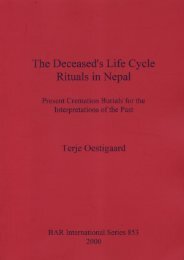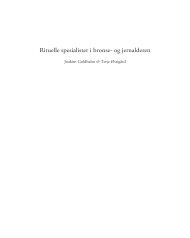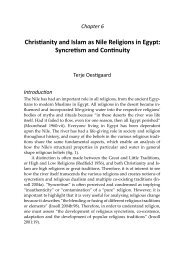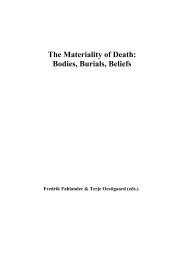Cremation, Caste, and Cosmogony in Karmic Traditions.
Cremation, Caste, and Cosmogony in Karmic Traditions.
Cremation, Caste, and Cosmogony in Karmic Traditions.
Create successful ePaper yourself
Turn your PDF publications into a flip-book with our unique Google optimized e-Paper software.
The pervasiveness of karma l<strong>in</strong>k<strong>in</strong>g micro- <strong>and</strong><br />
macrocosm together must be stressed. In other words,<br />
humans are at least partly responsible for the creation of<br />
the world. The gods alone do not create new be<strong>in</strong>gs,<br />
neither <strong>in</strong> the form of humans <strong>and</strong> animals nor ghosts;<br />
the process of <strong>in</strong>carnat<strong>in</strong>g a soul <strong>in</strong>to a new body is the<br />
result of a complex <strong>in</strong>terrelation between humans <strong>and</strong><br />
gods whereby each group of be<strong>in</strong>gs observe their strict<br />
roles <strong>and</strong> functions. Thus, the creation of humans or any<br />
other be<strong>in</strong>g is a process by which all the forces of the<br />
universe partake, <strong>and</strong> consequently it is also a recreation<br />
of cosmos – cosmogony. The karmic importance of this<br />
underst<strong>and</strong><strong>in</strong>g implies that a failure <strong>in</strong> participat<strong>in</strong>g <strong>in</strong><br />
the cosmological co-operation <strong>and</strong> process will<br />
<strong>in</strong>evitably affect the universe as a whole. Participation <strong>in</strong><br />
funerals <strong>and</strong> observ<strong>in</strong>g the prescribed rites <strong>and</strong> taboos<br />
are therefore of the uttermost importance for the<br />
deceased, the <strong>in</strong>dividual, <strong>and</strong> cosmos <strong>in</strong> general. This is<br />
a part of a person’s dharma, which might be described as<br />
moral action <strong>and</strong> religious duty, or the duty of the<br />
Householder. Although karmic consequences are<br />
determ<strong>in</strong>ed <strong>and</strong> religiously prescribed, performances of<br />
rituals are done to change one’s life path <strong>and</strong> better<strong>in</strong>g<br />
both this <strong>and</strong> future lives; hence it is possible to alter<br />
one’s dest<strong>in</strong>y (Wadley 1983:147). Therefore, karma is<br />
not determ<strong>in</strong>istic because the possibility to commit s<strong>in</strong>s,<br />
which deviates from the gods’ will, is a sign of free will<br />
(Hertz 1996).<br />
Different theories about karma do not necessarily<br />
contradict each other because they do not always belong<br />
to the same level of analysis (Hiebert 1983:122). Even<br />
though karma is important <strong>in</strong> order to underst<strong>and</strong> <strong>and</strong><br />
expla<strong>in</strong> human fortunes, it is not the only or most<br />
important way as far as everyday misfortunes are<br />
concerned. Despite the ethicisation <strong>and</strong> rationalisation of<br />
the rebirth doctr<strong>in</strong>e, the logic of karma is not<br />
straightforward. A difference between H<strong>in</strong>du <strong>and</strong><br />
Buddhist hermeneutics is also found <strong>in</strong> the religious<br />
texts. The Buddhist texts are more consistent through<br />
time <strong>and</strong> space <strong>in</strong> their <strong>in</strong>terpretation of the fundamental<br />
dogmas whereas the H<strong>in</strong>du texts are less consistent, <strong>and</strong><br />
therefore karmic ideas are more rational <strong>in</strong> Buddhism<br />
than <strong>in</strong> H<strong>in</strong>duism (Keyes 1983:12). Moreover, the<br />
Tibetan Buddhists seem to concentrate more upon<br />
karmic prospects than retrospects (Lichter & Epste<strong>in</strong><br />
1983). Buddhists see karma more as an impersonal force<br />
than practis<strong>in</strong>g H<strong>in</strong>dus who believe that God has<br />
“written” a person’s karmic dest<strong>in</strong>y on one’s forehead at<br />
birth (Keyes 1983:15). Karma <strong>in</strong> Buddhism has to be<br />
understood <strong>in</strong> the light of the Noble Truths, <strong>and</strong><br />
especially that all is suffer<strong>in</strong>g. Even though Buddhists<br />
believe <strong>in</strong> the good life <strong>and</strong> strive towards<br />
improvements, all these goods are impermanent, <strong>and</strong> the<br />
impermanence will eventually causes unhapp<strong>in</strong>ess<br />
(Lichter & Epste<strong>in</strong> 1983: 225). Unhapp<strong>in</strong>ess <strong>and</strong><br />
suffer<strong>in</strong>g are consequences of actions. Today’s<br />
occupation may therefore be an <strong>in</strong>dication of future lives<br />
because one will become what one does today. Tibetan<br />
10<br />
Buddhists assume that blacksmiths <strong>and</strong> butchers <strong>in</strong><br />
particular are <strong>in</strong> a downward spiral regard<strong>in</strong>g rebirth.<br />
Due to previous s<strong>in</strong>s they have already atta<strong>in</strong>ed a low<br />
birth; a birth which <strong>in</strong>evitably fosters further demerit<br />
because the butcher kills <strong>and</strong> the blacksmith makes the<br />
tools that kills (Mumford 1989:203). However, despite<br />
scholarly <strong>and</strong> priestly <strong>in</strong>terpretation of re<strong>in</strong>carnation,<br />
there are a lot of uncerta<strong>in</strong>ties <strong>and</strong> ambiguities among<br />
common people. When <strong>and</strong> how many times a person<br />
will be <strong>in</strong>carnated is a matter of controversy, <strong>and</strong> most<br />
people believe that good people go to heaven <strong>and</strong> bad<br />
people to hell, <strong>and</strong> they th<strong>in</strong>k <strong>and</strong> hope they will go to<br />
heaven.<br />
F<strong>in</strong>ally, the law of karma is not a closed system. More<br />
precisely, a person’s karma is dependent upon other<br />
people’s karma. The deceased’s dest<strong>in</strong>y <strong>and</strong> further<br />
rebirth is only partly dependent upon his own karma.<br />
Previous deeds <strong>and</strong> acts are the po<strong>in</strong>t of departure for the<br />
further <strong>in</strong>carnation, but the descendant’s performance of<br />
the death rituals <strong>and</strong> the subsequent ancestral rites are of<br />
the uttermost importance. The bardo <strong>in</strong> the Tibetan Book<br />
of the Dead is the <strong>in</strong>termediate period by which the soul<br />
is guided through the lim<strong>in</strong>al phase, where it might be<br />
led astray unless it is supervised by lamas. Funerals are<br />
structured around men, <strong>and</strong> the importance of hav<strong>in</strong>g a<br />
son cannot be emphasised enough. The role of the sons<br />
is explicitly stated <strong>in</strong> H<strong>in</strong>du texts. In the Garuda Puranas<br />
it is stressed; “There is no salvation for a man without a<br />
son. He can never atta<strong>in</strong> heaven without a son” (Garuda<br />
Purana II, II.13.18 & III, II.29.4). “A man is released<br />
from his debt to the manes on see<strong>in</strong>g his son’s face. A<br />
man is released from three types of debts (to the sages,<br />
gods <strong>and</strong> manes) on see<strong>in</strong>g his gr<strong>and</strong>son. On see<strong>in</strong>g his<br />
son, gr<strong>and</strong>son, <strong>and</strong> great gr<strong>and</strong>son he atta<strong>in</strong>s eternal or<br />
celestial worlds” (Garuda Purana III, II.25.33-34). “Even<br />
a man hav<strong>in</strong>g sons, dy<strong>in</strong>g without the performance of<br />
these rites, does not atta<strong>in</strong> salvation. A man without son<br />
by do<strong>in</strong>g these rites beforeh<strong>and</strong> shall have a happy<br />
journey on the Great Highway” (Garuda Purana II,<br />
II.14.14). The role <strong>and</strong> functions of ritual specialists <strong>and</strong><br />
relatives have to be emphasised <strong>in</strong> karmic traditions.<br />
Death is life <strong>and</strong> life is death, a circle which stresses the<br />
life-giv<strong>in</strong>g processes <strong>and</strong> pr<strong>in</strong>ciples govern<strong>in</strong>g the<br />
transformations <strong>and</strong> changes from one sphere to another.<br />
Pashupat<strong>in</strong>ath: <strong>Cremation</strong> as cosmogony<br />
The Pashupat<strong>in</strong>ath temple is the holiest place <strong>in</strong> Nepal<br />
for Shiva devotees. Accord<strong>in</strong>g to some H<strong>in</strong>dus, <strong>in</strong> the<br />
whole world because Shiva’s head was born at this<br />
place, <strong>and</strong> it is still present as the l<strong>in</strong>ga <strong>in</strong> the ma<strong>in</strong><br />
temple. Other parts of Shiva were born at various places,<br />
but the head is the god’s most auspicious <strong>and</strong> vital<br />
cosmogonic part, <strong>and</strong> hence, Pashupat<strong>in</strong>ath is the most<br />
sacred place for Shiva devotees. The river Bagmati is<br />
mythological appear<strong>in</strong>g from Shiva’s head, unit<strong>in</strong>g life,<br />
death, <strong>and</strong> water (fig. 1.3). Thus, this is the most











![Fullmono-AK [P2118].indd - oestigaard](https://img.yumpu.com/18994998/1/177x260/fullmono-ak-p2118indd-oestigaard.jpg?quality=85)